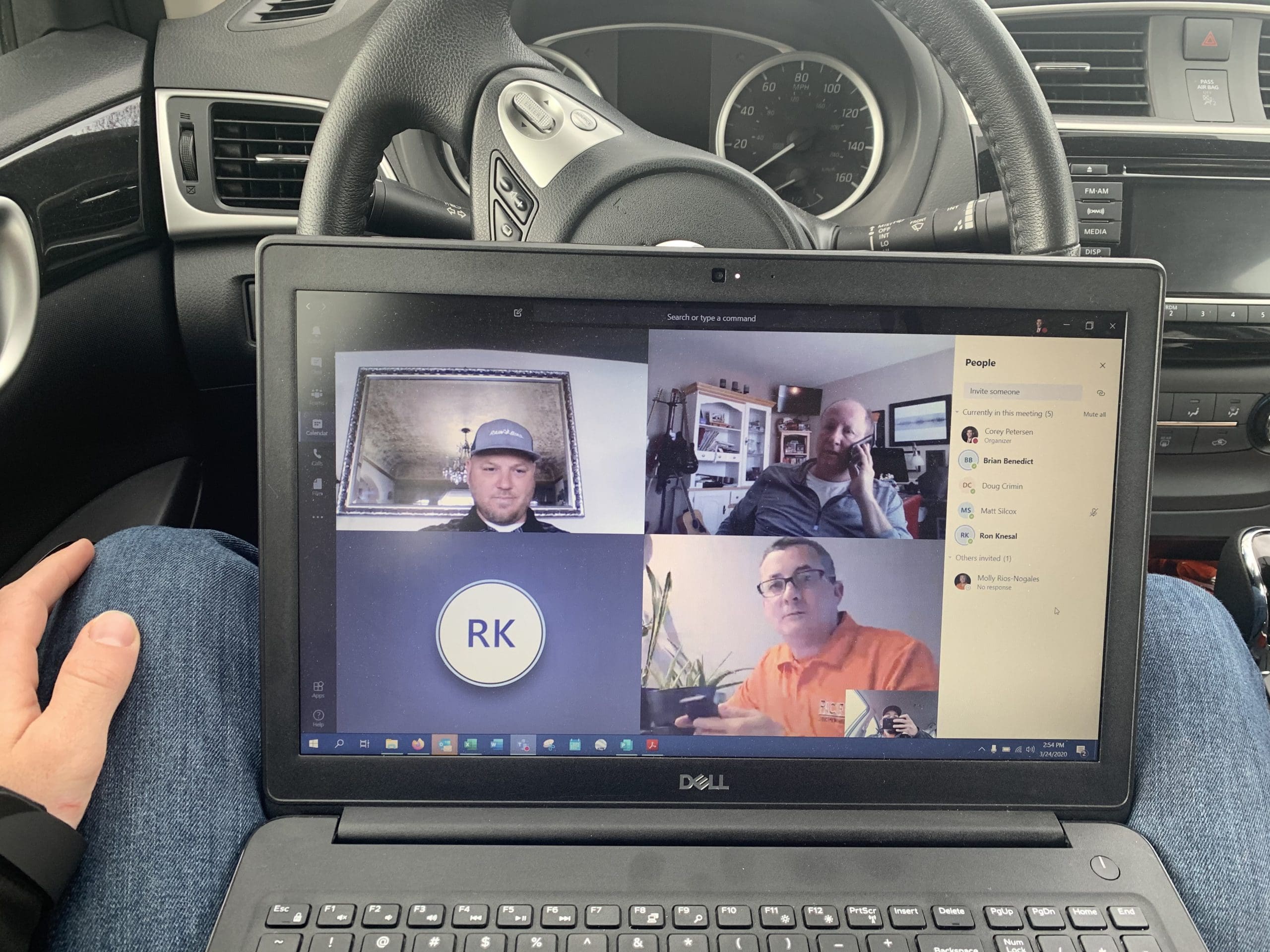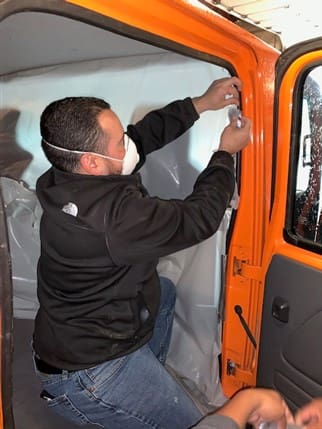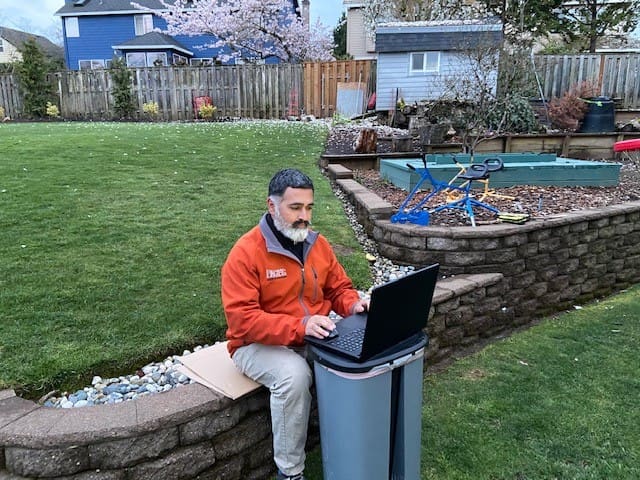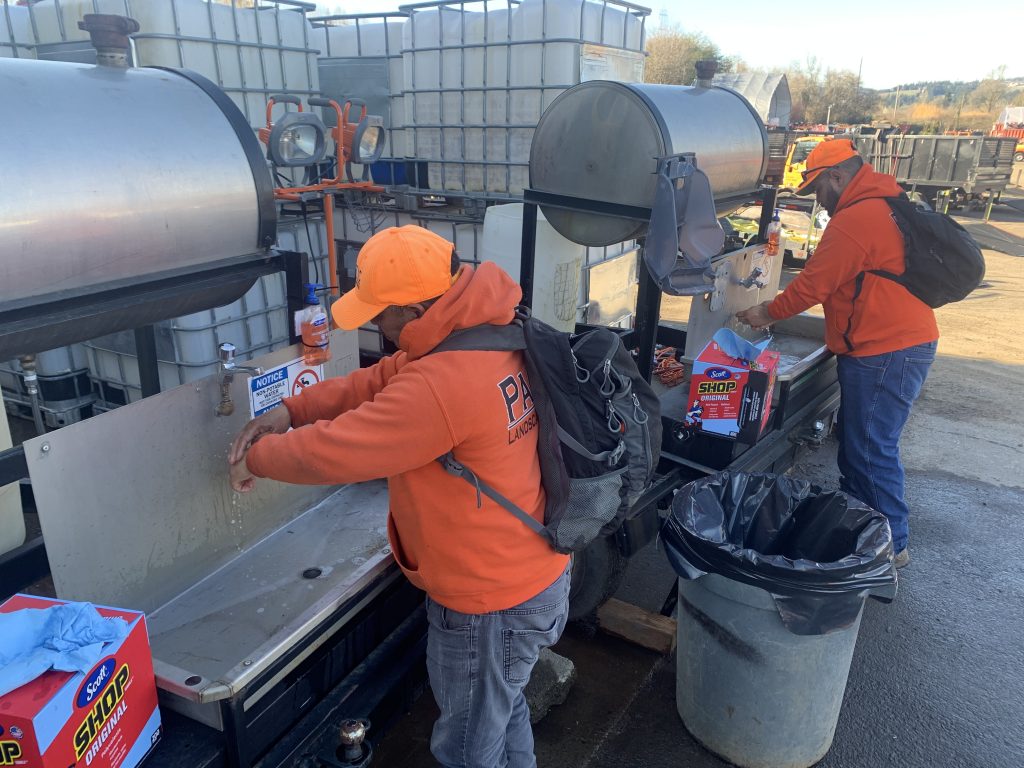
To say the current situation is unusual and difficult is not an overstatement. The COVID-19 crisis is evolving daily and industry companies are adapting their operations to protect and serve their staff – and client needs.
“We have spent a tremendous amount of time over the past two weeks evaluating the recommendations to keep our employees and the general public safe and have been modifying and training our employees continually to follow these new work rules,” says Bob Grover, president of Pacific Landscape Management, in Hillsboro, Oregon. “Honestly, it’s been difficult to get people to take this serious especially early on, but we have been very diligent, and our team is living by the social distancing and sanitation standards.”
Following official recommendations (see the new industry guidelines) industry companies have put additional measures in place to keep people safe.
Ben Bowen, landscape designer for Ross NW Watergardens, based in Portland, Oregon, says they educated themselves on the symptoms and the importance of staying away at the first sign of illness weeks ago.

“Our installation crews are made up of members of the same house, so they are not being exposed to new people while working with their crew,” Bowen says. “When I visit a site, or when our delivery person is on site, we are careful to maintain a 6′ distance.”
Moore says they’ve been communicating to their employees the need to maintain distancing and to wash their hands on a regular basis along with disinfecting their vehicles and offices multiple times a day. Also, Grassperson’s office staff have all been working remotely.
“We moved away from a manual clock-in process and now the crew texts our operations manager when they get here in the morning and when they leave in the afternoon and so someone remotely actually clocks him in and out,” says Jack Moore, CEO of Grassperson Lawn Care & Landscape, in Lewisville, Texas. “We’ve got cameras that we can verify when they got here and when they left.”
Moore says three weeks ago, they reduced their crew sizes to 3-man crews and have staggered crew start times as well. He says they’re looking into switching to two-man crews in the next few days.
Regular Client Communication is Key
Landscape and lawn care companies are seeing increased client questions and concerns – with people wanting to know if there are any changes to the services you’ll be providing and what you are doing to ensure the safety of your employees and clients.
“We have been very proactive in communicating with our customers on the justification of our status for continuing to work and our procedures to ensure the safety of our team and the general public,” Grover says. “This has been met with tremendous appreciation. We’ve learned throughout all that we do, that the more we communicate the more we are appreciated. You don’t get credit when people don’t know what you’re doing so telling them what you’re doing gives you a lot of opportunities to get credit for being a responsible, professional stand-up company.”

Moore says when they started sensing something was going to happen, they communicated to clients at the first of March that they decided to move some of their weekly services to bi-weekly in anticipation of having some team members who won’t be able to work in the near future.
Bowen has been communicating with clients in a number of ways as he continues to work, including maintaining a 6’ plus distance from clients if they meet in person, emailing and teleconferencing.
“Next week I am going to have an initial consultation with a client, they are going to be in their home and on the phone with me while I walk the property,” Bowen says.
Moore says there’s been a small percentage of customers reaching out asking about the situation and majority have been very gracious.
On Grassperson’s website, they’ve included a pop-up on the website that explains they have been considered an essential business. Ross NW Watergardens also has a dedicated coronavirus webpage for visitors with questions. Grover cautions against only posting about COVID-19 on your website as it alone is insufficient when it comes to communication.
One of the challenges right now in communicating with customers is to not be buried amongst the many other emails currently discussing the virus.
“I’m telling them what we’re doing to try to stay ahead and be proactive,” Moore says. “But the message really is that we’re going to reduce our service level over the next 30 days proactively in order to try to maintain your property in an acceptable manner, but at the same time, in order to be able to allow us to do all these other things we’re trying to do to keep our employees safe.”
Changes to Service
Bowen says they haven’t scaled back any of their services as of yet, but he’s qualifying leads more thoroughly than ever.
“With many people working from home, it is a great time for them to get a quote for a project – maybe just to find out if they can afford it,” Bowen says. “I am trying to limit my in-person contact to people who are serious about doing their project in the near future.”
Moore says they’ve reduced their number of landscape installation projects due to manpower issues because two-thirds of their H-2B workers have been held at the border as the consular office figures out how to process them during COVID-19.
“We have had a few of our customers suspend service,” Grover says. “Those have been from retail establishments, hotels and restaurants who’ve had to shut their doors. We’ve also had a few customers hold up on pre-approved enhancements. We anticipate that enhancement sales will be the biggest impact as that is oftentimes significantly more discretionary than the ongoing maintenance. We hope this may be just delays until we get back to normal business operations, but I do believe there will be a reduction in especially enhancement sales this calendar year.”
When to Change Course?
As for whether or not he might consider suspending work, Moore says it would be the moment he feels his employees are in jeopardy. If one crew member became ill, then that crew would be shut down, but if they had multiple people become sick, Moore says they would shut down for 14 days.
Bowen says one scenario where they would consider closing is if their employees were no longer comfortable working as they are not going to pressure them to work.

“It could become socially unacceptable in our area to be working, even if it is technically allowed,” Bowen says. “We recognize the importance of being good neighbors and don’t want to be causing anxiety to people just over a landscaping project that can certainly wait!”
The other situation would be if landscaping became considered a non-essential business.
“If there is specific clarification that landscaping is not an essential service or barred from working, we would honor the law,” Grover says. “With any vagary that we can justify our operation, we will continue to work. Our reputation with our customers is important and the survival of our employees’ livelihoods is paramount in this decision. There’s no amount of social programs in place that can replace the value of normal.”


Comments are closed.